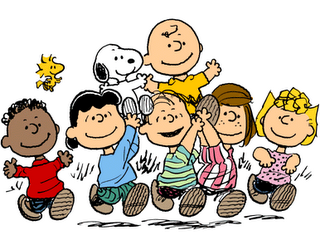Peanuts

Charles M. Schulz was born on this day in 1922 in Minneapolis, Minneapolis.
A shy, awkward World War II veteran known to his friends as "Sparky" (named after "Spark Plug," the horse in Billy DeBeck's cartoon Barney Google), Schulz drew a one-panel cartoon for the St. Paul Pioneer Press called Li'l Folks, but could not manage to get it accepted for syndication until lowly United Features bought it in 1950, renaming it Peanuts (a name, by the way, that Schulz could not stand).
The strip, drawn simply without much background detail, focused on the adult-sounding conversations of a neighborhood of children -- principal among them Charlie Brown, the hopeful misfit loser; Linus, the little savant with a security blanket; Linus' sister Lucy, the challenging "fussbudget"; and Charlie's cool, multifarious beagle Snoopy. During the 1950s, his comic strip was a critical and campus pleasure, but as culture and politics roiled amid violent changes during the late 1960s, Schulz's gentle comic strip -- blending the pain of unrequited love and occasional bursts of anger at being misunderstood, with gnomic wisdom and compassionate humor -- became the most popular of all newspaper comic strips in the U.S., read alike by conservative adults and the rebellious youth. While Tom Stafford commanded Apollo 10 to the moon, with a command module named Charlie Brown and a lunar module named Snoopy, clear across the pop culture landscape the Grateful Dead's keyboardist Ron McKernan adopted the name of another Peanuts character, "Pig Pen." As commentators would observe, Schulz's Peanuts was an area of common ground for feuding generations.
By 1969, Peanuts became a multi-media phenomenon, with an Emmy-winning Christmas special (A Charlie Brown Christmas, 1965, featuring the piano jazz score of Vince Guaraldi), a musical (You're a Good Man, Charlie Brown, 1967, starring Gary Burghoff and Bob Balaban as Charlie Brown and Linus) and a feature-length movie (A Boy Named Charlie Brown, 1969). Books, dolls, lunchboxes, T-shirts and countless other promotional items eventually netted United Features over $1 billion a year, and collections of Schulz's comics eventually sold over 300 million copies in 26 languages. Although Schulz was earning $40 million a year at the height of Peanuts' popularity, he remained a reclusive homebody, giving millions to charity while preferring to work away at his drawing table.
During the 1980s and 90s, Peanuts was no longer the touchstone it had once been, but it still invariably occupied the place of honor at the top of the front page of the comics in nearly every newspaper in the U.S. Schulz was diagnosed with Stage-4 colon cancer and announced his retirement on December 14, 1999, admitting in a TV interview, "It is amazing that they think that what I do was that good . . . I just did the best I could."
Schulz passed away on the evening before the appearance of the last comic strip he created, on February 12, 2000 in Santa Rosa, California. On Saturday, May 27, 2000, his fellow newspaper cartoonists honored Schulz in an unprecedented fashion by including a reference to Peanuts in each of their strips.
Labels: Pop Culture





0 Comments:
Post a Comment
Subscribe to Post Comments [Atom]
<< Home